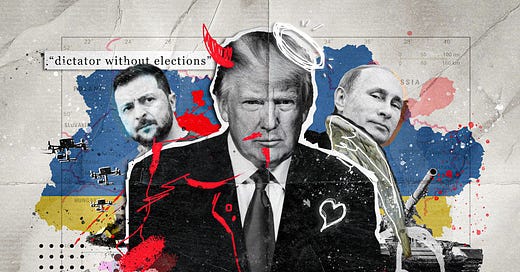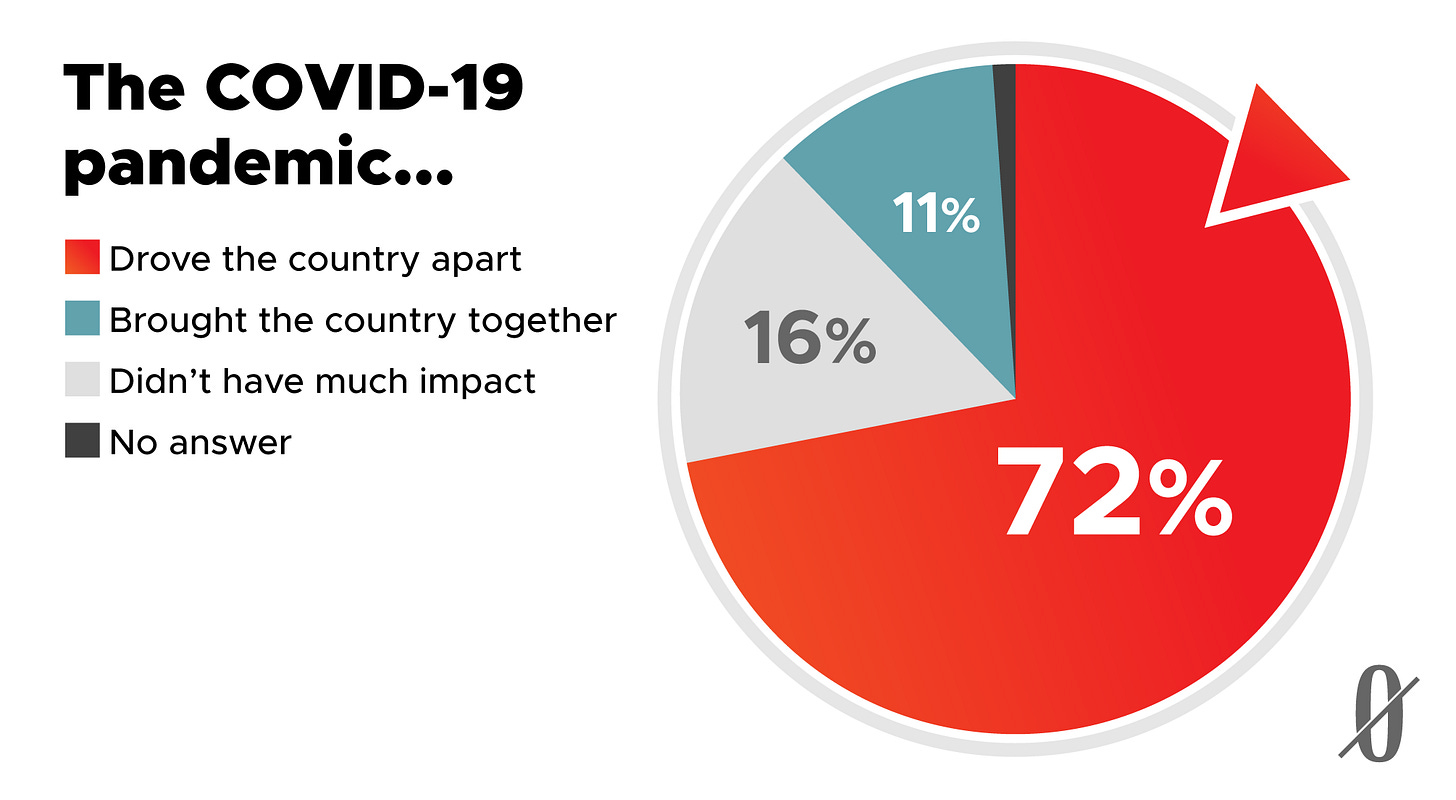Trump’s Very Good, Very Bad Week on Ukraine
Plus: CIA vs cartels, Musk seems conflicted, AI-powered news, pandemic blues, and more!
Note #1: It’s only February, but we’re going to go out on a limb and name the winner of this year’s (first ever) NZN subscriber of the year award: Anthony Walker. Some months ago, Anthony offered to give us a little free tech help, and before long a little had turned into a lot. Anthony engineered our migration from a Substack URL to our very own nonzero.org URL, which we completed a few weeks ago (though we remain on the Substack platform)—and which, as we noted at the time, is an important step on NonZero’s path to total world media domination.
Note #2: I’ll be discussing world events with NZN Managing Editor (and, for two more weeks, Earthling Guest Editor) Connor Echols on this week’s NonZero World, which will show up in the NonZero podcast feed and on the NonZero YouTube channel today.
—Bob
—The CIA is conducting drone surveillance flights over Mexico to help identify fentanyl labs, the New York Times reports. The practice began under President Biden but has expanded significantly under President Trump, who wants the agency to take on a more aggressive role in the fight against Mexican cartels.
—Roughly three-quarters of US adults believe the Covid pandemic did more to drive Americans apart than to bring them together, according to a recent poll from the Pew Research Center. (See below for more on how the pandemic might have shifted American politics.)
—Russia is nearing a deal with the new government of Syria that would allow Moscow to maintain at least a limited military presence in the country, according to Bloomberg. Western officials had hoped that Syria’s new leaders—whose rebel coalition toppled the Assad regime in December—would oust all Russian forces as retribution for Moscow’s support of Assad during Syria’s long civil war.
—The New York Times is officially embracing the AI era, Semafor reports. The Gray Lady will now allow staffers to use specified AI tools for research, fact-checking, headline writing, and even drafting article summaries for Times newsletters—but not for drafting the articles themselves, making major edits, or generating images.
—At the Munich Security Conference, Chinese Foreign Minister Wang Yi proposed that China and the European Union coordinate their investments in global infrastructure by aligning China’s Belt and Road Initiative with the EU’s Global Gateway strategy. (Back in 2018, former Secretary of State John Kerry mentioned that he’d hoped to see the US partner with China on global finance projects like the BRI, “and I said that to President Xi, but somehow we got off track.”)
—Google unveiled an AI-powered “co-scientist” that, the company says, can “formulate demonstrably novel research hypotheses” and outline experiments to test them, thus helping to uncover “new, original knowledge.” The new tool—which comprises a “coalition of specialized agents”—has already helped researchers at Stanford University identify existing drugs that could be repurposed to treat liver fibrosis, the Financial Times reports. (For the latest on a more intimate form of AI companionship, see below.)
—An Israeli military prosecutor indicted five soldiers for allegedly beating and sexually abusing a Palestinian detainee at the Sde Teiman base, which Palestinians claim is a hotbed of torture and abuse, the New York Times reports. The charges could serve as evidence that Israel is capable of holding its soldiers to account for war crimes—a key part of the country’s rationale for rejecting the jurisdiction of the International Criminal Court.
For those who want to see an end to the war in Ukraine, this was a good week and a terrible week. It was good because the Trump White House showed it was serious about seeking a peace deal between Kyiv and Moscow. It was terrible because Trump went out of his way to make things as cruel toward Ukraine as possible.
Let’s start with the upside, though. On Tuesday, Secretary of State Marco Rubio met with Russian Foreign Minister Sergey Lavrov, marking the start of talks aimed at ending the war in Ukraine and resolving broader issues in US-Russia relations. That alone was a major and welcome move, even if it triggered outrage from most establishment voices. (Peter Baker of the New York Times accused President Trump of “switching sides” in the new cold war, and Michael McFaul, a former US ambassador to Russia, deplored what he called Trump’s “relentless caving to Putin.”) Ukraine has little hope of winning on the battlefield, so peace talks with Russia offer the most plausible way out of a grinding war.
Also, to its credit, the White House put everything on the table. Unlike many policymakers in the US and Europe, Trump recognizes that the war is as much about Russia’s relationship with the West as it is about Russia’s relationship with Ukraine. Rubio signaled earlier this week that sanctions on Moscow could be lifted through talks, and Defense Secretary Pete Hegseth made clear last week that Europe’s security architecture would be part of the discussion. Trump has even floated the idea of a trilateral agreement whereby Russia, China and the US would each agree to cut their military budgets in half. As a paper from the Quincy Institute pointed out this week, “if Washington recognizes that Moscow’s security concerns extend beyond Ukraine,” then the US “can employ leverage that Kyiv lacks in direct bargaining with Moscow.”
Tuesday’s talks even yielded some results, albeit modest ones. According to Washington’s readout, the parties came to three key agreements. The first is for each side to move toward a normalization of diplomatic relations, which would facilitate further negotiations. The second is to start Ukraine peace talks aimed at producing a deal that is “enduring, sustainable, and acceptable to all sides.” The third is to seek cooperation on issues of mutual interest, particularly those that may arise from an end to the conflict. (This last point is particularly important, given how much the war has undermined US-Russian cooperation on key transnational issues, including nuclear proliferation.)
But then there was Donald Trump. Taking umbrage at a statement from Ukrainian president Volodymyr Zelensky that Trump was stuck in a “disinformation space,” Trump took to Truth Social and lobbed a barrage of insults, calling the Ukrainian leader a “modestly successful comedian” and a “Dictator without Elections.” He also accused Zelensky of having “talked the United States of America into spending $350 Billion Dollars, to go into a War,” of “playing Biden ‘like a fiddle,’” and of having done “a terrible job” as president. Since much of this was unfair or false (Zelensky enjoys approval ratings of well over 50 percent, and Russia invaded Ukraine, not the other way around, and so on), it managed to appall not only US allies but also many Republicans in Washington. This public conflict can only discourage Kyiv from taking part in the talks, which Trump may well know.
Not content with harsh words, Trump also pressured Kyiv to sign over a 50 percent interest in all of its minerals, an offer that Zelensky, for now, has managed to refuse. It’s hard not to blanch at the prospect of the United States raiding the scarce resources of a war-torn country with a smaller GDP than Kansas. Certainly, it’s no way to encourage friendship, or any kind of relationship, between any country and the United States.
In the long term, Trump’s approach could also do significant damage to international law. While any end to the war was likely to include a tacit (if not formal) recognition of Russian sovereignty over parts of Ukraine—a dismal concession following Russia’s severe violation of the UN Charter—a typical US president would at least have made a big deal of this. But Trump doesn’t seem to care. In fact, he has even floated some cross-border aggression of his own, including threats to bomb cartels in Mexico and seize the Panama Canal by force.
We can expect a lot of this sort of thing over the next four years. Old and broken stuff gets tossed in favor of the new, some of it better and a lot of it worse. What's new and good is that the White House is determined to bring an end to the war in Ukraine. What's new and bad is that it’s also determined to plunder Ukraine and trample on international law in the process.
In an interview with Fox News host Sean Hannity, Elon Musk pledged to recuse himself from any government work that may pose a conflict of interest. President Trump, sitting next to Musk, reiterated the point: “If there’s a conflict, he won’t be involved.”
Of course, Musk is pretty busy these days, and he may not have a lot of time to focus on those potential conflicts. But, in case it'll help him out, we’ve started a list:








